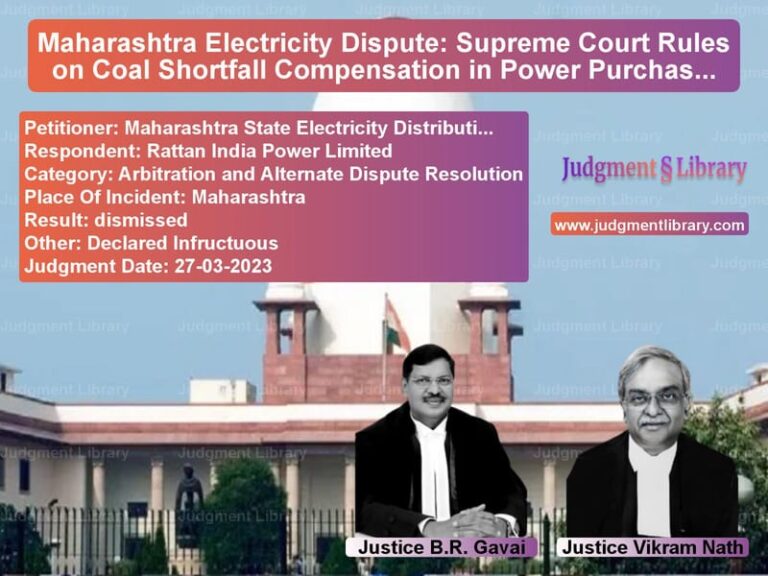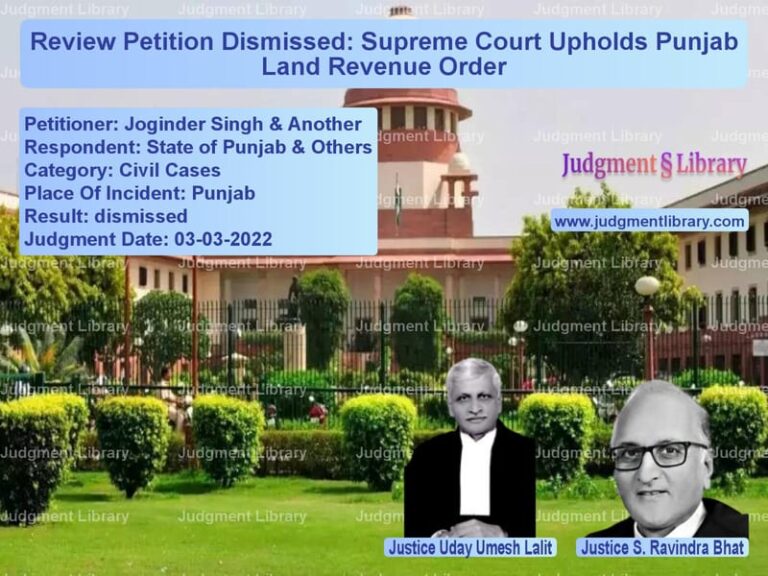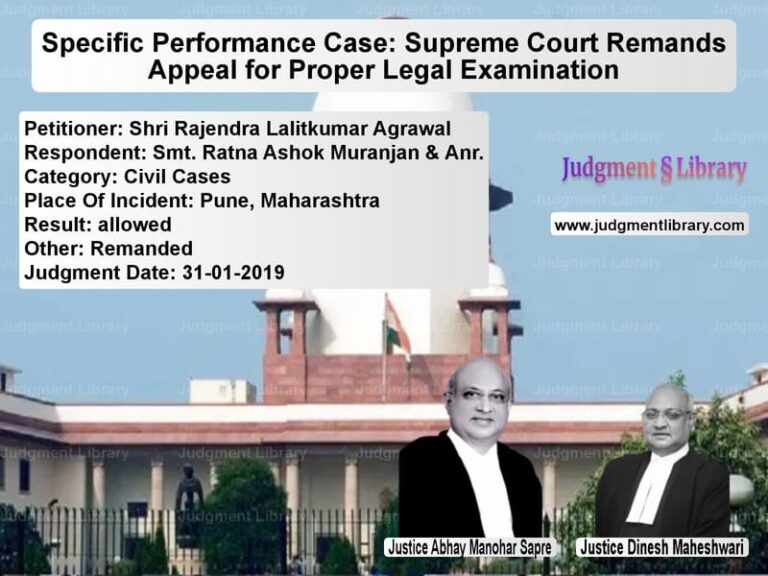Supreme Court Remands Bail Order in Arms Smuggling Case for Fresh Consideration
The case of State of Uttar Pradesh vs. Amit Pal Singh revolves around a bail order granted to the respondent, who was accused of serious offenses related to illegal arms trading and supplying weapons to naxalites. The Supreme Court, after reviewing new evidence submitted by the prosecution, set aside the bail order and remanded the matter to the High Court for fresh consideration.
Background of the Case
The State of Uttar Pradesh filed an appeal challenging the bail granted to the respondent, Amit Pal Singh, by the High Court. The prosecution alleged that the respondent was involved in illegal arms dealings, including selling weapons to criminal groups and naxalite elements in states like Bihar, Jharkhand, and Jammu & Kashmir. The case was investigated based on intelligence reports and forensic evidence that indicated that weapons had been altered and sold illegally.
The prosecution highlighted the respondent’s connection to Guru Ram Das Armoury, a licensed arms dealership in Kanpur. Investigators found discrepancies in the stock register, indicating that multiple arms had been sold without proper documentation, and some of these weapons had later been recovered from naxalites.
Prosecution’s Allegations
The prosecution presented the following key allegations against the respondent:
- The respondent was a licensee of Guru Ram Das Armoury, which was involved in illegal arms sales.
- Weapons had been sold without proper verification of buyers’ licenses, and records failed to mention the specific state licensing authorities.
- Investigations revealed that 26 arms licenses cited in sales records did not actually exist.
- The respondent allegedly purchased defective or obsolete firearms, modified them using foreign components, changed their bore specifications, and sold them as new weapons.
- Several of these weapons had been found in the possession of criminals and naxalites, indicating a direct link between the accused and unlawful activities.
- In 2008, a co-accused, Mantoo Sharma alias Sanjay Singh, was arrested in Patna with three rifles and cash while attempting to sell arms to naxalites. He admitted to obtaining the weapons from Guru Ram Das Armoury.
- The respondent had filed over 40 applications on different dates to delay framing of charges in the trial court.
High Court’s Bail Order
The High Court, in its order granting bail, considered the following:
- The respondent had been in jail for a prolonged period.
- The prosecution had not conclusively proved that the weapons were deliberately sold to criminal organizations.
- The co-accused’s confession was not sufficient to establish guilt.
Based on these considerations, the High Court granted bail to the respondent.
Supreme Court’s Intervention
Aggrieved by the High Court’s decision, the State of Uttar Pradesh filed an appeal before the Supreme Court. During the proceedings, the Supreme Court directed the Senior Superintendent of Police, Kanpur, to provide a detailed affidavit regarding the respondent’s conduct and the likely timeline for concluding the trial.
New Evidence Presented
The affidavit submitted by the police provided fresh insights into the case:
- It confirmed that Guru Ram Das Armoury had sold arms to buyers without verifying the legitimacy of their licenses.
- Several weapons were sold to individuals in naxalite-affected areas such as Bihar and Jharkhand.
- Some weapons sold by the respondent had been modified illegally and later confiscated from individuals who were unaware of their true origin.
- The respondent was implicated in at least 13 related criminal cases, indicating his deep involvement in illegal activities.
- One of the co-accused, Guru Charan Singh (the respondent’s father), had already been denied bail by the Supreme Court in an earlier related case.
Based on this affidavit, the prosecution argued that the bail order granted by the High Court should be reconsidered as it failed to consider crucial facts.
Supreme Court’s Ruling
The Supreme Court, after reviewing the new evidence, set aside the High Court’s bail order. The Court held that:
- The High Court had not adequately considered the seriousness of the allegations and the nexus between the respondent and criminal activities.
- The delay in trial was partially due to deliberate attempts by the accused to prolong proceedings.
- The fresh affidavit provided substantial new evidence that warranted re-examination of the bail order.
Final Orders
The Supreme Court ruled:
- The High Court’s order granting bail to the respondent was set aside.
- The matter was remanded to the High Court for fresh consideration, with directions to assess the case based on the new evidence presented.
- The High Court was requested to decide the case within three months to ensure a fair and speedy trial.
Legal Implications of the Judgment
The Supreme Court’s ruling underscores the following legal principles:
1. Importance of Fresh Evidence
The case highlights how new evidence can significantly alter the outcome of bail hearings. The Supreme Court’s intervention ensured that all relevant facts were considered before granting bail.
2. Seriousness of Arms Smuggling Offenses
The judgment reinforces that courts must be cautious when granting bail in cases involving illegal arms trading and organized crime. Such offenses have far-reaching implications for national security.
3. Preventing Abuse of Legal Process
The Court acknowledged the deliberate delays caused by the accused to avoid trial. This ruling serves as a warning against misuse of procedural tactics to escape justice.
4. Role of Higher Courts in Bail Jurisprudence
The ruling demonstrates that the Supreme Court plays a crucial role in correcting errors in bail decisions, especially when lower courts overlook critical aspects of a case.
Conclusion
The Supreme Court’s decision in State of Uttar Pradesh vs. Amit Pal Singh is a landmark ruling that ensures that bail orders in serious criminal cases are not granted lightly. The remand of the case for fresh consideration by the High Court ensures that all relevant facts are carefully examined before determining whether the accused should be released.
This judgment serves as a strong precedent for handling cases involving illegal arms trading, organized crime, and national security threats. It reinforces the principle that bail must be granted only after a thorough examination of all available evidence.
Don’t miss out on the full details! Download the complete judgment in PDF format below and gain valuable insights instantly!
Download Judgment: State of Uttar Prade vs Amit Pal Singh Supreme Court of India Judgment Dated 18-07-2017.pdf
Direct Downlaod Judgment: Direct downlaod this Judgment
See all petitions in Bail and Anticipatory Bail
See all petitions in Extortion and Blackmail
See all petitions in Terrorist Activities
See all petitions in Judgment by Kurian Joseph
See all petitions in Judgment by R. Banumathi
See all petitions in allowed
See all petitions in Remanded
See all petitions in supreme court of India judgments July 2017
See all petitions in 2017 judgments
See all posts in Criminal Cases Category
See all allowed petitions in Criminal Cases Category
See all Dismissed petitions in Criminal Cases Category
See all partially allowed petitions in Criminal Cases Category







